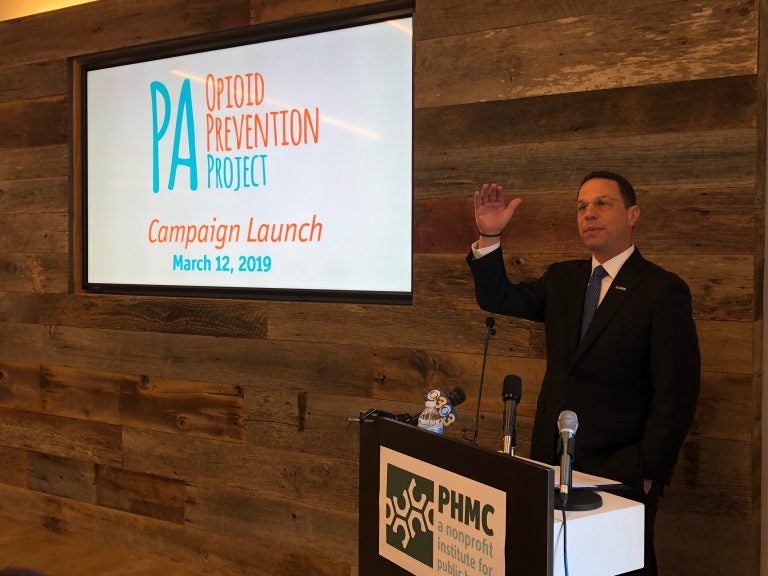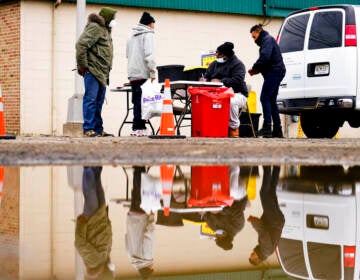New Pa. ads urge teens to think before accepting prescription painkillers
Most with substance-use disorder begin using opioids as teenagers, so a Pennsylvania campaign aims to get young people to stop and think before taking pills.

Pennsylvania Attorney General Josh Shapiro said statewide prevention efforts are key in informing his office's law enforcement approaches and in making sure people don't get addicted in the first place. (Nina Feldman/WHYY)
Maybe you remember “Just Say No,” the slogan of the war on drugs back in the 1980s and ’90s. Well now, Pennsylvania has “It’s Your Move.”
Spearheaded by the Pennsylvania Opioid Prevention Project, the state-funded campaign will target young people ages 14 to 18 on social media and with outdoor ads across the state. It cost $300,000 and will run initially for a month.
State Attorney General Josh Shapiro helped launch the campaign, funded by the Pennsylvania Commission on Crime and Delinquency, which he used to head. Shapiro touted his office’s achievements in fighting the opioid epidemic: a drug bust in Philadelphia’s Kensington neighborhood; a dramatic increase in arrests of doctors running pill mills; and a sweeping investigation into pharmaceutical companies. But, he said, public-health efforts like this ad campaign help inform how law enforcement approaches the crisis — and keep people from becoming addicted in the first place.
“Drug addiction is a disease, not a crime, and it needs to be dealt with that way,” Shapiro said. “But I think in law enforcement, we’ve not always understood that, and we’ve not always put policies in place to deal with that effectively.”
The ads were designed by youth recruited from across the state. One shows a woman crouched in her medicine cabinet and advises viewers not to get “trapped in their medicine cabinet.” Another features a pill with headphones and reads “Don’t Take a Pill to Chill.” Videos feature diverse high school students who send the message that they’re relatable, saying to the viewer, “You’re just like me.” Confronted with an offer of prescription painkillers at a party, they advise the viewer to stop and think.
Jayla Baxter, who attends Bucks County Technical High School, helped come up with the ad campaign. She said she hears about people at school popping pills in the bathrooms or at dances. Before joining the campaign, she hadn’t known the risks prescription painkillers pose.
“I thought that if my favorite rapper or singer was doing it, it must be safe, it must be cool,” said Jayla, 15. “So when I actually learned about what was actually happening and that it was actually killing people, it made me think differently about these lyrics and these songs.”
National research shows the majority of those with substance-use disorder started using opioids before the age of 18, and, according to the National Institute on Drug Abuse, young adults are the biggest misusers of prescription opioids.
“’Just Say No’ didn’t work,” said Keli McLoyd, director of the Philadelphia Coalition on Children and Opioids and a policy adviser with Public Health Management Corporation, which coordinated the campaign effort.
It was ineffective because teenagers are going to be naturally curious when they’re told not to do something, she said.
“It’s Your Move” takes a harm-reduction approach by encouraging teens to slow down and think about the consequences, she said.
“What we know about brain development, too, is that the adolescent brain just isn’t ready to take on these choices,” McLoyd said. “If these ads can help people not start, or start using at a later date, or sort of get past that really strong at-risk period of adolescence, we know right there they’re going to be in a much better place.”
Disclosure: Public Health Management Corporation supports WHYY.
WHYY is your source for fact-based, in-depth journalism and information. As a nonprofit organization, we rely on financial support from readers like you. Please give today.





